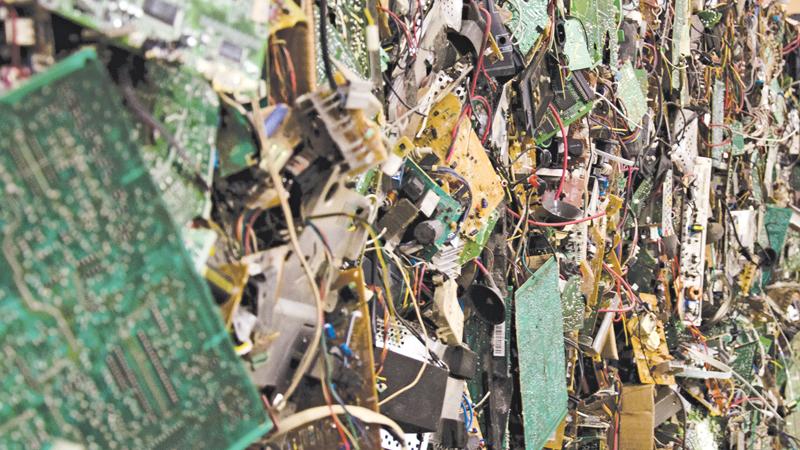
Environmental activists who seek a win-win situation for the well-being of the environment, called upon policy makers to take into consideration environmental factors as well, before entering into agreements with other countries to ensure that the country is not a ground for dumping scrap metal discarded by other countries.
Eco-activists have expressed reservations about the implementation of the Sri Lanka-Singapore Free Trade Agreement (SLSFTA) as it entails provisions for the free import of goods and services which are hazardous to health and have long-term environmental repercussions.
The Centre for Environmental Justice (CEJ) at a media briefing last week said that it is in no way against free trade agreements but noted that such agreements should not infringe upon the laws pertaining to the environment.
“We see the SLSFTA makes clear provisions for banned waste material to make its way into the country without any obstruction and this is something very serious that the country should take cognizance of if people are to lead a healthy life,” CEJ Executive Director Hemantha Withanage said. The CEJ notes that some of the items in the export-import list of the SLSFTA such as Polyclorinated Biphenid (PCB) was prohibited to be imported in 1979. PCB was banned worldwide under the Stockholm Convention in 2001.However, Sri Lanka’s export/import list still permits the importation of PCB.
“The SLSFTA permits the importation of PCB, PCB contaminated or containing items free under various HS (harmonised system) codes including 29039913.
Although the gazette extraordinary 2044/40 of November 9, 2017 published under the Import-Export Control Act No 1 of 1969 has banned some of these items it is not reflected in the FTA annex referring to the tariff schedule in Sri Lanka,” CEJ notes.
The Centre further notes that DDT is a banned item for importation since 1976. However the FTA permits the importation of it under the HS code 29039220. Endrin and Dieldrin are some of the banned pesticides and weedicides that are allowed to be imported under the FTA.
According to the Centre various types of waste are contained in both Sri Lanka and Singapore lists such as HS Code 12130010- straw, 26211000- ash and residues from incineration of municipal waste, 28053010-waste and scrap of rare earth metals, 30069200-phamaceutical waste, 38251000 municipal waste38252000 sewage and sludge and 38253000 - clinical waste.
“Sri Lanka becoming a dumping yard of Asia is a possibility due to the absence of waste management laws. Measures to strengthen regulations on waste importation and handling of hazardous waste is not satisfactory,” Withanage said.
However, he said in comparison, Singapore has a better regulations and law enforcement on waste management. Most items in the Customs of Singapore list are not generated within its territory.
Singapore according to statistics produces about 60,000 mt of electronic waste annually. According to the National Environmental Agency (NEA) Singapore produced less waste but recycled less last year.
NEA shows that 4.72 tonnes of waste was recycled last year- about 50,000 tones fewer than the previous year’s 4.77 million tones.
Overall Singapore produced less solid waste last year: 7.7. million tones fewer than the 7.81 million tones in 2016.
For years China has been the world’s largest importer of waste- a position which many countries took advantage of to dump excess waste. However, the surprise move by Beijing to ban taking in 24 types of scraps from this year onwards has compelled dumpers to look for alternative yards.
“Those who are scrambling for alternative places to discard waste will make use of Singapore as a transit point to dump crap in Sri Lanka,” Hemantha said.
However, the CEJ notes that the Basel Convention is the only regulation to stop any move to use the country as a dumping ground for waste.
The Ministry of Megapolis and Western Development plans to set up three waste to energy plants in the country.
A spokesman for the Ministry of Megapolis and Western Development when contacted said the notion that the SLSFTA will pave the way for the country to be a dumping yard for waste is an exaggeration and added that the FTA with Singapore and for that matter any other agreement entered into by Sri Lanka does not leave room for disposal of residues in the country.
“There are stringent laws pertaining to waste management in Sri Lanka and in Singapore as well, which cannot be breached under any circumstance.
The opinion about waste being dumped in the country through the FTA is a fabricated lie.
There is no truth in that as all measures have been taken before entering into the FTA to address the waste issue emanating from the agreement,’ the spokesman said.
Meanwhile, State Minister of National Policies and Economic Affairs Dr. Harsha de Silva clarifying the clause on import of waste under the SLSFTA at a media briefing at the UNP headquarters recently said the status quo on the import of waste under the SLSFTA will remain and that the notion of bringing down municipal waste, plastics, chemical, human waste and scrap mental is not true.
He said neither the waste of the 20 million population of Sri Lanka could be exported nor the waste of Singapore’s five million population could be imported to Sri Lanka under the SLSFTA. The GATT 1994 agreement states specifically the rules prohibiting the import of solid waste.
